I could hardly believe it when I saw this poll come out.
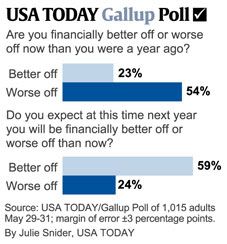
It's a testament to effective public relations that a majority of people believe that they will be better off next summer than they are right now. If perception was all that mattered then the mission of fixing the economy has already been accomplished.
Unfortunately for all of us, actual facts mean more than managing perception. Just ask Baghdad Bob.
With that in mind, let's look at those pesky inconvenient facts.
The often quoted statistic is that 70% of America's economy is consumer spending. That, in and of itself, is disturbing for reasons I will go into later on.
In the meantime, let's look at what the consumer has been up to recently.
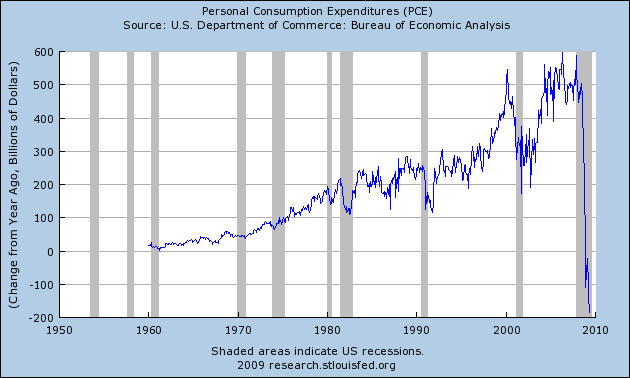
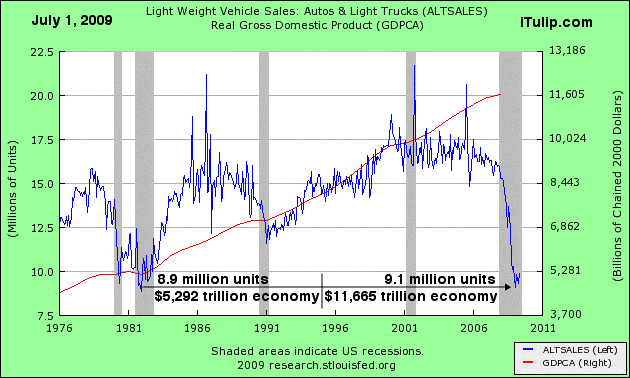
That's not looking very rosy to me, and it's filtering directly into manufacturing.
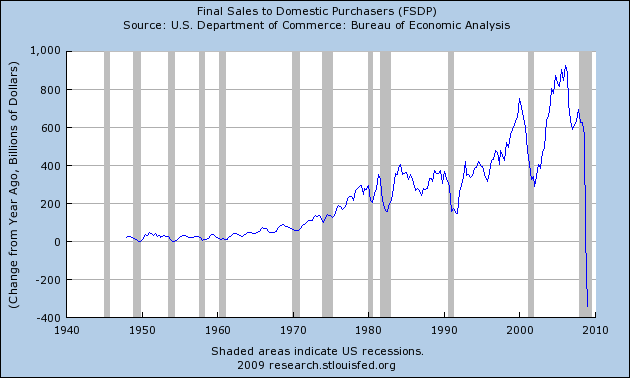
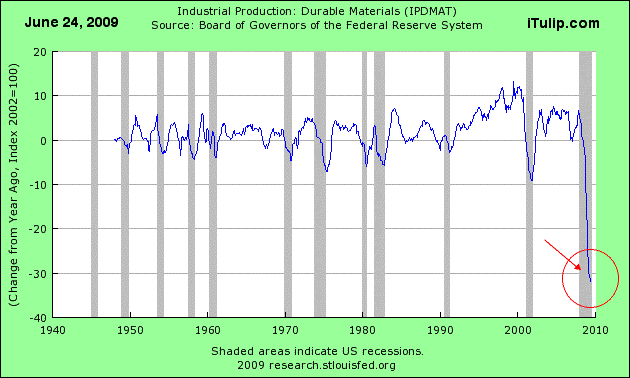
No matter how positive the attitude of The Great American Consumer (TGAC), it doesn't make a bit of difference unless he/she has an income. So let's look at the job situation.
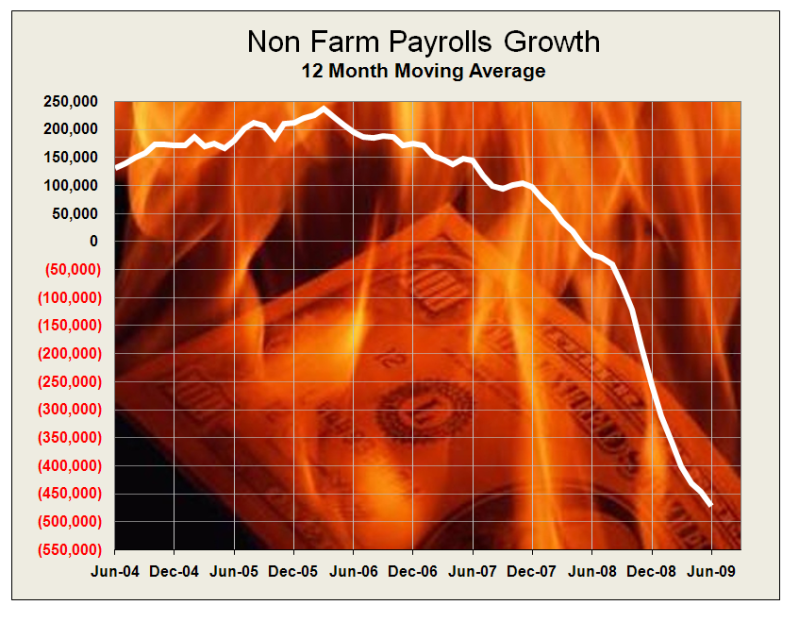
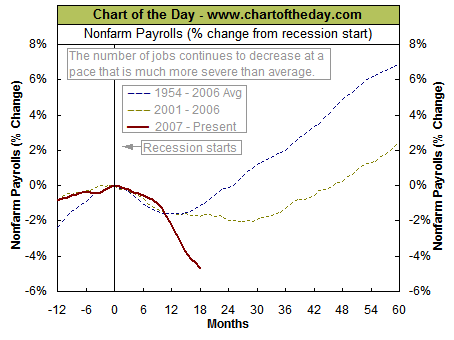
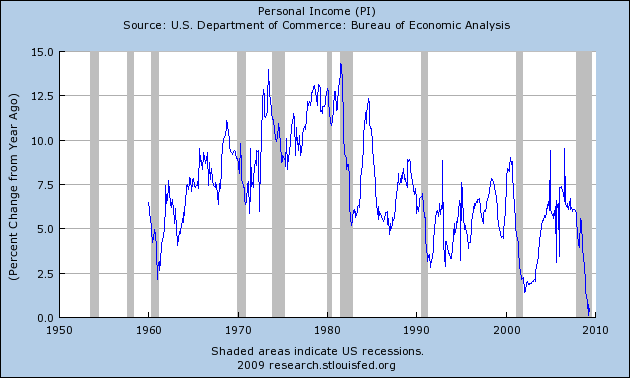
Without good jobs and higher income, the Great American Consumer simply can't step up and live beyond his/her means anymore. Almost every nation in the world is waiting for TGAC to restart buying things they don't need with money they don't have.
The reason that isn't going to happen is that the Great American Consumer no longer has an asset to borrow against.

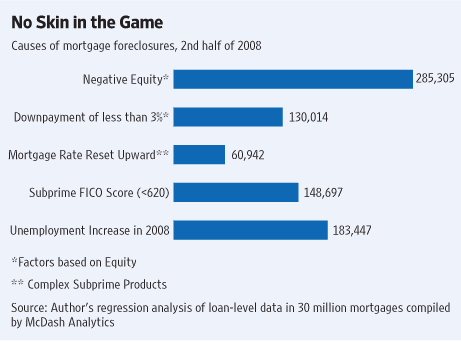
TGAC has already leveraged themselves to the hilt. He/she has nowhere else to turn, and is thus forced to save money and pay down existing debt.
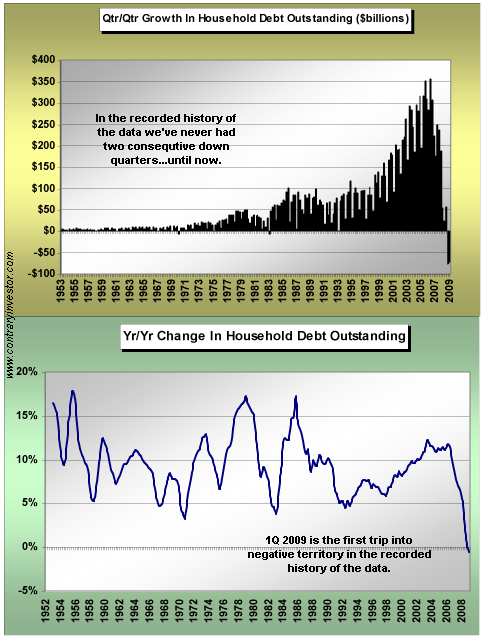
Even when TGAC mortgage's have been modified, they are more than likely doomed.

So what must happen for TGAC to begin spending again? Two things must change, neither problem has even been addressed so far.
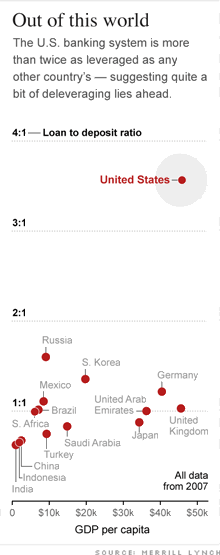
The banking system must cut down on its overhanging debt. But to do that it must write off its bad debts. The government has allowed the banks to change its accounting in order to hide the bad debts, thus the banks are zombies - sucking up capital while not loaning it out. Those zombie banks live off of the healthy parts of the economy, weakening it.
In an economy that was an actual capitalist, free market system, those zombie banks would have been allowed to fail. We don't have that.
The other part of the economy that must change is this:

Notice how no nation on Earth, except maybe the UK, devotes as little to savings and investment as America (and the UK may be in even more trouble than we are).
It's the sign of an unhealthy economic system. We shouldn't be depending on other nations, like China, to do our savings and investing for us.
Both the zombie bank problem, and the lack of savings and investment, are normally cured by a deep recession. However, the bailouts, deficit spending, accounting rules, and government stimulus, are all designed to prevent those those healthy corrections from happening.
So why should anyone expect the economy to be better next year?

Comments
The Two Economies
I'm convinced at this point, reading the very valid macro economic indicators and also reading the threat to the U.S. dollar, the continual destruction of the middle class and the obvious, the massive unemployment numbers, plus the hidden ones, we have two economies going on in the United States.
Even during the "recovery" after the last recession, it was a multinational corporation, a super rich, a housing bubble recovery. Wages were still declining, everywhere people as workers getting thrown away like disposable diapers, more debt, decrease in social mobility.
Let's call it the middle class economy. I don't think it has a prayer's chance of recovering unless we actually get real action on a host of issues and that is labor issues, curtailing massive offshore outsourcing, trade is a huge component, health care is a more minor component, education is as well and frankly there is no way, none that the U.S. can continue with it's bringing in more immigrants, illegals either. It's labor supply 101 and there are so many problems for the people who live here already, that's where the action has to go.
But to rectify the difference between the EIs vs. what we know on the ground, on main street, somehow we need to dig into some real macro economic data which exposes this. I strongly suspect our EIs are biased towards multinational corporations, wall street, the "super elite" at this point.
At the same time, EIs as they are ....are important, for without those improving, main street doesn't have a chance but it's kind of like they can improve and still leave main street hanging out to dry.
Abandonment of the Labor/Progressive Movement
The EI are only pertinent to a select few at the top that may be amassing more wealth. The middle/lower classes are losing more and more ground.
The progressive/labor agenda has been abandoned. It began with the marketing to the 60's Sense of Self and big corporations finding a way to make money off a sense of "Individualism".
The final nail was driven by Clinton following a political marketing scheme - namely Mark Penn. The middle class turned their collective heads to the most vulnerable in society - now the middle class is being shunned, as well.
Adam Curtis (BBC) did a spectacular expose' on the convergence of marketing/big business/politics in 2002. It is a 4-part series, but episode 4 showcases the Clinton/Blair campaigns.
I put this documentary into a FNV
The Trap.
While it's not really a documentary, more a manifesto and I thought it was truly thought provoking, especially in the influence of behavioral psychology and note, this is not good which is one of the reasons I harp on behavioral economics so much, it's much less quantifiable, various theories and there have been so many wrong headed beliefs coming from psychology it's enough to make your head spin. (pun intended).
But bottom line is Democrats sold out to corporate and special interests just like Republicans did and Clinton really was one of the worst. We haven't had a New Deal Democrat since Lyndon B. Johnson.
Now the spin is in with VP Biden suggesting that maybe they "underestimated" the unemployment rate.
Well, we were hear screaming, especially me, about how the Stimulus wasn't going to Stimulate because they were not putting conditions on the funds to go to U.S. workers for jobs in the U.S. In other words they did not tie the money to worker income, which is necessary for Keynes to actually work as intended.
Now they are back peddling. In addition we saw the report they are awarding contracts via the same corrupt methodology as Iraq contracts were awarded.
We had a massive jump in income, but that is in the form of tax cuts and it did not really go to those in need of a job...in need of real income.
Great minds think alike... err somewhat
Though I commend your analytical thinking - don't allow it to be a blind spot.
Consumers are not rational and neither are the markets; otherwise, we wouldn't be in this economic mess.
It takes looking outside one's personal interests (and immediate gratification) to the good of society as a whole to take bold, meaningful steps.
consumers are not rational
but behavioral psychologists and behaviorists assuredly are not!
Yours Truly,
Pavlov's Dog
On behalf of
all those like myself who hold a degree in Psychology, I'll not hold your misguided comment as a personal affront.
The video is about Freudian subliminal application in a Social Psychological setting, not behaviorism.
Behaviorists - such as Pavlov and Skinner - were able to infer cause and effect of a direct stimulus (dependent variable) within a statistically significant MoE.
Kinda' like the Recovery Act - only the RA has a higher MoE
The problem is the two economies
Are still linked. It isn't like England's 19th century three-tier economy where the poor used different money (though supposedly, just fractional values) than the rich.
I'd like to see our economy de-linked. Would be interesting to see what the middle class could do without being saddled down by bankers, politicians, and the cost of welfare.
As for the illegal immigrants, I'm about to write something on that, just need to find that article I read Saturday in the Oregonian on reverse-remittances. I think we're seeing the leading economic indicator to self-deportation in the number of immigrants asking poor relatives in their home countries for money.
-------------------------------------
Maximum jobs, not maximum profits.
-------------------------------------
Maximum jobs, not maximum profits.
de-linked?
How would you de-link the "Middle Class" with the other classes? Replace it with what?
--------------------------------------------
www.venomopolis.com
U.S. Consumer debt not shrinking much
This is related to my article above.